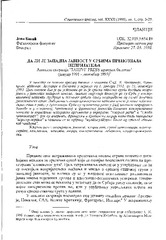Prikaz osnovnih podataka o dokumentu
Da li je zapadna javnost u Srbima prepoznala neprijatelja - Analiza sadržaja Tanjug press crvenih biltena, januar 1991 - decembar 1993
Did Western public opinion recognized the enemy in Serbs
| dc.creator | Bakić, Jovo | |
| dc.date.accessioned | 2021-10-12T10:19:50Z | |
| dc.date.available | 2021-10-12T10:19:50Z | |
| dc.date.issued | 1998 | |
| dc.identifier.issn | 0085-6320 | |
| dc.identifier.uri | http://reff.f.bg.ac.rs/handle/123456789/280 | |
| dc.description.abstract | U tekstu se izlaže pregled pisanja u štampi SAD, V. Britanije, Francuske, Italije, Austrije i Nemačke u periodu od 1. januara 1991. do 31. decembra 1993. Cilj analize bio je da ustanovi da li je srpska etnička grupa postala neprijatelj u javnosti zapadnih zemalja. Analiza sadržaja pokazuje da su Srbi u konzervativnoj štampi Austrije i Nemačke dobili sliku neprijatelja od samog početka jugoslovenske krize. Liberalna i socijaldemokratska štampa imala je više izbalansiran stav o ratu u Jugoslaviji. Srbi su od početka rata u BiH postali neprijatelj takođe i u američkoj, britanskoj i francuskoj javnosti.Nemačka konzervativna štampa je koristila istorijske argumente i paradigme 'hladnog rata' i 'sukoba civilizacija'; dok su američki, francuski i britanski mediji koristili paradigmu 'agresor-žrtva' i zalagali se za odbranu 'multikulturne Bosne od srpskog etničkog čišćenja'. | sr |
| dc.description.abstract | The author analyzed newspapers writting of USA, UK, France, Italy, Austria and Germany about Yugoslav crisis between 1. january of 1991. and 31. december of 1993. The aim of this undertaking was to see did the serbian ethnic group become the enemy in public of western countries. The content analysis showed that conservative Austrian and German newspapers, for example, Frankfurter Allgemeine Zeitung, Welt, Kurier, had the picture of enemy on the very beginning of Yugoslav crises. The liberal and social-democratic newspapers of Austria and Germany had more balanced attitudes about war on Yugoslav ground. The Serbs became enemy of American public as well as the British and French, especialy liberal and social-democratic, on the beginning of war in Bosnia and Herzegovina. The most part of texts in that the Serbs played role of enemy were published in conservative newspapers of Austria, Germany and in liberal newspapers of USA. The German conservative media used historical arguments and ''cold war'' paradigm or ''clash civilisation'' paradigm, like ''Serbian killers of kings'', or ''communist's barbarians'', or ''Serbian orthodox communism'', etc.. On the other hand, the liberal American media as well as British or French, used ''aggressor-victim'' paradigm, like ''poor multinational and multicultural Bosnia under attacks of Serbian wish for etnic cleansing''. | en |
| dc.publisher | Sociološko društvo Srbije, Beograd | |
| dc.rights | openAccess | |
| dc.rights.uri | https://creativecommons.org/licenses/by-sa/4.0/ | |
| dc.source | Sociološki pregled | |
| dc.subject | sukob civilizacija | sr |
| dc.subject | štampa | sr |
| dc.subject | socijal-demokratski | sr |
| dc.subject | neprijatelj | sr |
| dc.subject | mediji | sr |
| dc.subject | liberalni | sr |
| dc.subject | konzervativni | sr |
| dc.subject | komunizam | sr |
| dc.subject | javnost | sr |
| dc.subject | hladni rat | sr |
| dc.subject | agresor-žrtva | sr |
| dc.subject | social-democrat | en |
| dc.subject | public oppinion | en |
| dc.subject | newspaper | en |
| dc.subject | liberal | en |
| dc.subject | enemy | en |
| dc.subject | conservative | en |
| dc.subject | communist | en |
| dc.subject | cold war paradigm | en |
| dc.subject | clash of civilisation paradigm | en |
| dc.subject | aggressor-victim paradigm | en |
| dc.title | Da li je zapadna javnost u Srbima prepoznala neprijatelja - Analiza sadržaja Tanjug press crvenih biltena, januar 1991 - decembar 1993 | sr |
| dc.title | Did Western public opinion recognized the enemy in Serbs | en |
| dc.type | article | |
| dc.rights.license | BY-SA | |
| dc.citation.epage | 29 | |
| dc.citation.issue | 1 | |
| dc.citation.other | 32(1): 3-29 | |
| dc.citation.spage | 3 | |
| dc.citation.volume | 32 | |
| dc.identifier.fulltext | http://reff.f.bg.ac.rs/bitstream/id/16623/did-western-public-oppinion-recognized-the-enemy-in-serbs_Content20File-PDF.pdf | |
| dc.identifier.rcub | https://hdl.handle.net/21.15107/rcub_reff_280 | |
| dc.type.version | publishedVersion |

